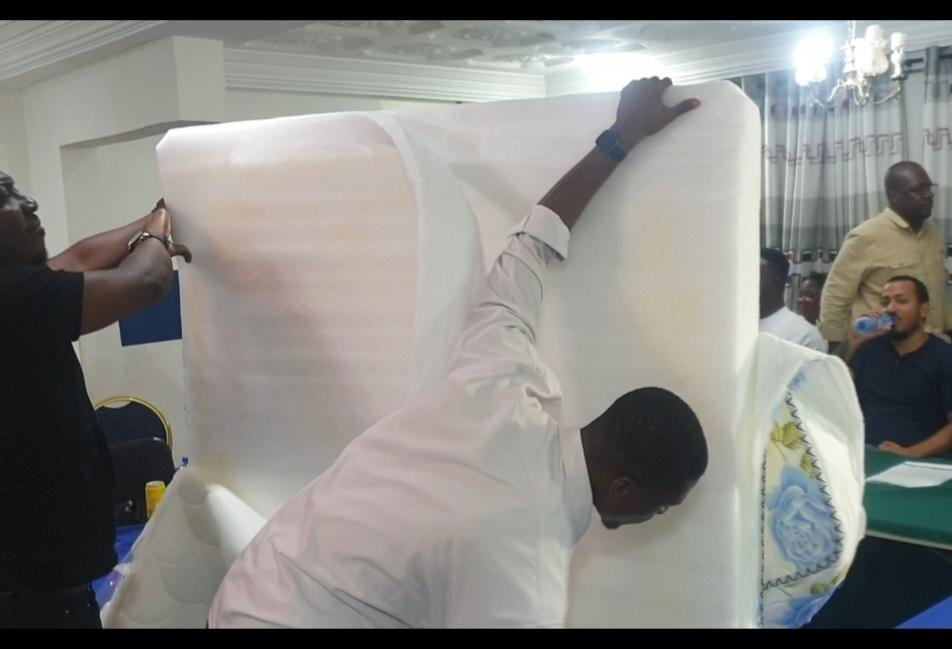News
Seek early medical care to increase chances of childbirth- Fertility Specialist

Women who desire to become mothers have been advised to seek early medical attention when they are experiencing a delay in child bearing as this could increase their chances of conception.
This advice follows an observation that some women often made the decision to get help from specialist when the situation was almost too late for any medical intervention thereby denying themselves the opportunity to have their own babies.
A Gynaecologist and In Vitro Fertilisation ( IVF ) Specialist, Dr. Wanjiru Ndengwa delivering a lecture on “Fertility Management Options – Messages for the Community ” at the Merck Foundation Health Media Training Programme said it was heartbreaking that some women wasted too much time moving from one place to the other due to misinformation and ignorance and only went to fertility centres as a last option.
The programme organised for journalists from various countries among others was aimed at building the capacity of media personnel for advocacy on infertile issues and stigmatisation.
She said issues of conception were but a serious subject which should not be taken for granted and so expert advice should be the first rather than last option explaining the basics of couple infertility treatment as “searching, finding and treating the causes”.
She said time was very critical in the life of women because child bearing age was time bound compared with men.
Dr. Ndengwa said women who had visited fertility centres on time had saved themselves unnecessary stress as talks, investigations, imaging investigations, ultra sound scan among others were done on time to fix their challenges unlike those who sought treatment late.
She mentioned infertility as infections, Sexually Transmitted Infections (STIs), abortions, deliveries (example child birth complications), blocked tubes, fibroid and other pathologies of women as some of the major causes of infertility.
She said early treatment increased the chances of a woman to have more children explaining that for instance a woman in her twenties who consulted Specialists early could have about four children while a woman in her forties could not do same due to the age factor.
The Gynaecologist and IVF Specialist said it was important for everyone to get the right information to prevent unfortunate cases of denying themselves the opportunity to be mothers due to ignorance.
She said upon examination, it had been found out that some women needed a small intervention in lifestyle change such as losing weight, change in diet or exercise to get pregnant.
She said others also needed treatment of infection, hormonal treatments, antibiotics, fixing of tubal blockage among others.
She disclosed that it was important for men to also seek medical attention when a woman was not conceiving because male factors such as poor quality sperms (azoospermia) could be the reason and so the blame should not be laid solely at the door step of a woman.
Dr. Ndengwa appealed to the public to desist from stigmatising childless couples as it caused them stress which affected the results of efforts to get pregnant.
From Dzifa Tetteh Tay, Tema.
News
Watch your mattresses!…they can cause chronic back pain, other health disorders

Local mattress manufacturers have raised serious concerns over the influx of substandard mattresses, warning that these products pose significant health risks to consumers and threaten the sustainability of Ghana’s mattress industry.
At a press briefing held in Kumasi on Tuesday, manufacturers accused unregistered foreign entities, particularly Chinese firms, of flooding the market with cheap mattresses made from polystyrene.
Mr Yaw Ampem Darko, a spokesperson for the local manufacturers, warned that prolonged use of substandard mattresses, especially those made with polystyrene, could result in chronic back pain, musculoskeletal disorders, poor posture, and diminished sleep quality.
These health implications, they stressed, were not always immediately evident but accumulate over time, especially among vulnerable populations such as children and the elderly.
This material, typically used for packaging, is considered unsuitable and unsafe for bedding.
According to industry leaders, these sub-standard products have been circulating for at least five years, gaining traction among unsuspecting consumers due to their unusually low prices.
“These mattresses are being sold at suspiciously low prices, luring unsuspecting consumers who are unaware of the health dangers.”
“We are not just protecting our businesses; we are protecting Ghanaian lives. The government must act swiftly to stem this tide before more citizens fall victim to these dangerous products,” Mr Yaw Ampem Darko stated.
The Ghana Standards Authority (GSA) has acknowledged the issue and, in response, announced a nationwide enforcement campaign aimed at clamping down on the production, distribution, and sale of substandard mattresses.
The campaign, which was scheduled to take effect from September 30, 2025, was empowered by the GSA Act, 2022 (Act 1078), which authorises the Authority to seize and seal non-compliant products and impose sanctions on offenders.
In a statement signed by the Director General of the GSA, Professor George Agyei, the authority cited Sections 29 and 43 of the Act, reiterating that all mattresses sold in Ghana must meet established national standards or face confiscation.
The statement further emphasised that mattresses failing to meet these standards not only compromise sleep quality but also contribute to long-term health complications, including spinal and neck pain.
Despite the GSA’s commitment, manufacturers have expressed frustration over delays in implementation and called for stronger enforcement mechanisms.
They urged the GSA to work in close collaboration with the Customs Division of the Ghana Revenue Authority and national law enforcement agencies to identify and prosecute violators of Ghana’s quality standards.
Manufacturers are also appealing to consumers to remain vigilant and prioritise their health by verifying that any mattress they purchase bears the GSA certification mark.
Moreover, they caution the public against purchasing suspiciously cheap mattresses that lack proper labelling or identifiable branding, as these were often indicators of substandard or counterfeit products.
As the official enforcement deadline had expired with no show, the local producers insisted that much more than business interests were at stake.
They argued that without swift and sustained action, the health and safety of Ghanaian consumers would continue to be compromised.
“Public awareness, strict enforcement, and collaboration among regulatory bodies are essential if we are to protect the integrity of the local industry and the wellbeing of the Ghanaian people,” Mr Darko indicated.
From Kingsley E. Hope, Kumasi
Join our WhatsApp Channel now!
https://whatsapp.com/channel/0029VbBElzjInlqHhl1aTU27
News
Raissa Initiative demands harsher punishment for sexual abusers of girls

The Founder of the Raissa Child Protection Initiative, Ms Raissa Sambou, has urged authorities to impose severe punishment on individuals, including teachers and guardians, who sexually abuse young girls.
Speaking in an interview to mark this year’s International Day of the Girl Child (October 11), Ms Sambou condemned the increasing cases of sexual exploitation involving minors, describing such acts as “heartless, criminal, and a total betrayal of trust.”
She noted that those entrusted with the care and education of children must not be the same people who violate them, stressing that “anyone found guilty of abusing a girl child must face the full rigours of the law without leniency.”
The International Day of the Girl Child is observed annually to promote the rights of girls, empower them to reach their full potential, and draw attention to the challenges they face worldwide.
Ms Sambou lamented that poverty continues to push many young girls into vulnerable situations, exposing them to exploitation.
She expressed concern that some headmasters, teachers, and community members who should protect girls rather take advantage of them.
“This must stop immediately. The safety of every girl must never be compromised,” she said, urging the public to report all forms of abuse to the appropriate authorities and called for swift action by law enforcement agencies against perpetrators.
Addressing girls directly, Ms Sambou encouraged them to take their education seriously and to believe in their potential.
“It is possible to be young and responsible. Your future is bright, protect it, believe in it, and never let anyone dim your light,” she advised.
She further urged girls to choose their friends wisely, stay disciplined, and speak up if anyone makes sexual advances toward them.
Ms Sambou concluded with a rallying call for collective action, saying “speak up, protect them, and empower them. Together, we can end the sexual exploitation of girls.”
By Esinam Jemima Kuatsinu
Join our WhatsApp Channel now!
https://whatsapp.com/channel/0029VbBElzjInlqHhl1aTU27






